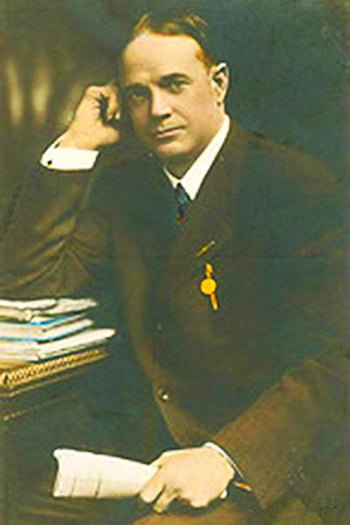Billy Sunday – 1862-1935

Billy Sunday
Billy Sunday will always be recognised as of one of Christendom’s most colourful characters. Born in 1862, Sunday was a professional baseball player and part-time fireman.
Billy Sunday’s Early Years
Billy Sunday was born as William Ashley Sunday in Story County, Iowa. His father died of pneumonia in a war camp four months after Billy’s birth. His mother later remarried, but when her second husband abandoned them, Billy and his older brother were sent to an orphanage.
It was here that his athletic skills were noted and developed. When he was 21, Billy was signed to the Chicago White Stockings, becoming highly popular with fans. He moved to the Pittsburgh Pirates in 1890, remaining there for 8 years. It was during this time he was converted through the ministry of the Garden Mission in Chicago in 1886.
He began attending Jefferson Park Presbyterian Church, where he met his wife, Helena Thompson. Marrying her in 1988. In 1891, Sunday officially ended his baseball career and began to work for the YMCA where he gained invaluable experience that would later be used in his evangelistic efforts.
In 1903 and received training from J. Wilbur Chapman, a Presbyterian pastor and evangelist, in the planning and promotion of large evangelistic crusades.
From 1896 he launched out on his own as an itinerant evangelist until his death in 1935, during which time it is claimed that he won a million converts to Christ.
He used his fame as a former baseball player as a way to attract people to meetings, which proved to be a successful strategy. He mostly preached in tents because there weren’t any buildings large enough to accommodate the huge crowds that flocked to hear him speak.
Later, temporary wooden meeting places called “tabernacles” were employed, seating up to 18,000 people – all on a dirt floor covered with sawdust to keep down the dust. This was the origin of “hitting the sawdust trail” as converts came forward to dedicate their lives to Christ.
Billy Sunday’s Success
His success was due to a number of factors, including advanced planning, superb organization, massive publicity, musical excellence, specialist ministries to businessmen, women, students and other sectional interests. Thousands of church members were recruited to assist a group of at least twenty specialists employed in the mechanics of city-wide crusade evangelism.
Despite his later decline in popularity, family problems and age restrictions, Sunday remained committed to his message and mission. During World War I he raised millions of dollars, and his preaching against alcohol was influential in helping pass Prohibition. He worked tirelessly, preaching nearly 20,000 sermons, an average of 42 per month. At the peak of his ministry, he was preaching more than 20 times a week. In 1935 Billy Sunday suffered a mild heart attack, and, after ignoring the doctor’s order to rest, he passed away that same year on November 6 in Chicago.
Sunday’s sensational and flamboyant preaching style appealed to the masses who responded to his sometimes outrageous sermons on moral issues, especially the evils of alcohol.
Sunday can be described as a revivalist – a powerful and successful evangelist who used all the ‘means’ he could to see people converted – and who occasionally saw signs of true revival.
Tony Cauchi
For further research:
Billy Sunday: Full Documentary – YouTube
List of Billy Sunday Newspaper Articles



